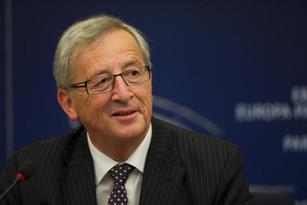
Mille grazie Signor Presidente,
Mr President of the European Council,
Dear colleagues,
It was an emotional moment for me last week when I attended my last European Council together with my good friend Donald. We are today debating the 147th European Council of my political career. And it is today the 105th time that I speak to you in this Plenary, the beating heart of European democracy.
In many of these 105 debates, I had to discuss the UK's departure from the European Union with you. In truth, it has pained me to spend so much of this mandate dealing with Brexit, when I have thought of nothing less than how this Union could do better for its citizens – a waste of time and a waste of energy.
The Commission has worked tirelessly to negotiate and renegotiate an agreement with the United Kingdom, to respect the UK's decision to leave the European Union. We now have a new agreement, which – again – creates the legal certainty for an orderly withdrawal of the UK from the European Union.
It took a huge amount of work to arrive at this point. I listened to Prime Minister Johnson in the same way as I listened to Prime Minister May. Our negotiators – mainly Michel Barnier – have once again worked around the clock. And once again, they have shown creativity and determination.
The agreement we reached with the United Kingdom's government addresses this Parliament's demands – all Parliaments' demands.
I will always regret the United Kingdom's decision to leave the Union. But at least we can look ourselves in the eye and say that we have done all in our power to make sure that this departure is orderly.
In this same spirit, we have done everything in our power to prepare the European Union for all eventualities, irrespective of what is happening on the other side of the Channel.
We need now to watch events in Westminster very closely. But it is not possible, not imaginable that this Parliament would ratify the agreement before Westminster will have ratified the agreement – first London, then Brussels and Strasbourg.
Wir haben uns, Herr Präsident, auch ausführlich mit dem Finanziellen Rahmen für die nächste 7-Jahres-Periode anlässlich des Europäischen Rates beschäftigt. Ich möchte hier noch einmal zu Protokoll geben, dass ich der Auffassung bin, dass die Zeit abläuft, die gebraucht werden wird, um zu einer Einigung im Rat und später anderswo zu kommen. Wenn wir weiter Zeit verlieren, werden wir in finanzielle Engpässe in den ersten zwei Jahren des Finanziellen Rahmens kommen.
Wichtig ist aber, dass Mitgliedstaaten und andere Akteure wissen, welcher Finanzrahmen für die nächste 7-Jahres-Periode gilt. Das brauchen junge Erasmus-Studenten, das brauchen Forscher, das brauchen viele andere und wir haben eigentlich nicht das Recht, diese wichtigen Partner für das Gelingen des Europäischen Projektes vor den Kopf zu stoßen – nur, weil wir unfähig sind, uns zu einigen.
Aber ich möchte ganz klar sagen: Das von der Kommission vorgeschlagene Haushaltsvolumen ist ein Minimum – ein Minimum! Und die Vorschläge, die jetzt auf dem Tisch liegen, auch die jüngsten Vorschläge des finnischen Ratsvorsitzes, sind nicht akzeptabel. Man kann Europa und seine Zukunft nicht mit 1% des Bruttosozialproduktes gestalten, dies wird nicht möglich sein.
Et puis, Monsieur le Président, nous avons parlé de l'élargissement. Je suis très déçu de la décision ou de la non-décision du Conseil européen. La Macédoine du Nord et l'Albanie étaient en droit d'attendre qu'on ouvre les négociations avec ces pays-là, qui ont fait de grands efforts. C'est une lourde erreur de ne pas avoir ouvert les négociations avec ces deux pays.
C'est une lourde erreur parce qu'elle frappe deux pays. Au cœur, c'est une lourde erreur parce que si l'Union européenne donne l'impression de faire des promesses et de ne pas les respecter, personne ne nous respectera à travers le monde.
Merci.
Details
- Publication date
- 22 October 2019
- Author
- Directorate-General for Neighbourhood and Enlargement Negotiations
